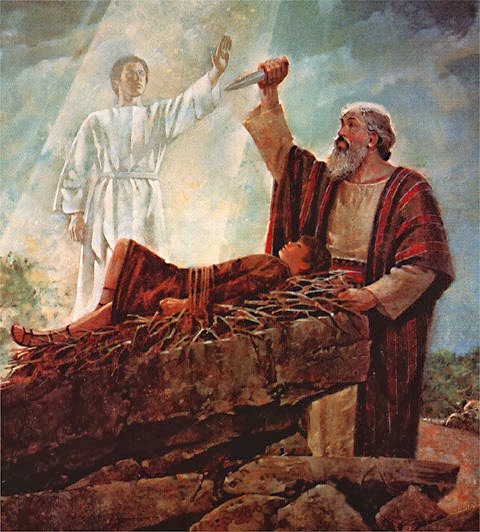
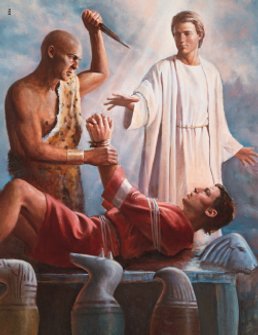
From 'Old Testament Prophets: Abraham'
2014 Ensign March
Anotated by Don R. Hender
Anotated by Don R. Hender
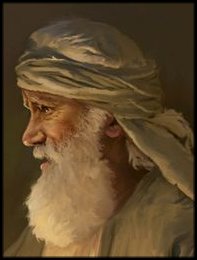
“As we follow Abraham's example, ... we will find greater happiness and peace and rest, [and] we will find favor with God and with man.”1 ~ President Spencer W. Kimball
["...finding there was greater happiness and peace and rest for me, I sought for the blessings of the fathers..." ~ Abraham 1:2]
"...the earth will be smitten with a curse unless there is a welding link [sealing and/or binding] of some kind or other between the fathers and the children..." ~ D&C 128:18
[This Section Is Given As if Adam Is Narrating His Story]
The marshland of Ur in Chaldea was my first home. The Chaldeans, including my father, worshipped idols and offered human sacrifices. But I believed in the one true and living God and prepared for the day when I could receive the priesthood, as my forefathers did.2
One day the Chaldeans bound me as a sacrifice on the altar of the god Elkenah. As they were about to kill me, I prayed to God for deliverance and my bonds were loosed immediately. Then the Lord spoke to me: “I have heard thee, and have come down to deliver thee, and to take thee away … into a strange land.”3
The Lord began to bless me immensely: I received the priesthood through Melchizedek,4 and the Lord covenanted with me that I would become the father of many nations and that the gospel would bless all humanity through my posterity. He changed my name from Abram to Abraham, meaning “father of a multitude.”5
I brought my family to Canaan, the land the Lord had prepared for us.6 The Lord promised me that His covenant regarding my posterity would be fulfilled through a son born by my wife Sarah. Sarah and I had been unable to have children. We wondered how we could have children when we were both so old—I was 100 and Sarah was 90.7 But as the Lord promised, we did have a son, Isaac.8
Some years later, there came one of the hardest trials of my life. Even though I had witnessed the pain of human sacrifice, the Lord asked me to offer my son Isaac as a sacrifice. My heart grieved, but I trusted the Lord. When I was about to slay Isaac, an angel called to me, saying, “Lay not thine hand upon the lad, … for now I know that thou fearest God, seeing thou hast not withheld … thine only son.”9 The Lord provided a ram to be sacrificed in Isaac’s place, which Isaac and I then offered to the Lord.10
Because of my obedience, the Lord reaffirmed His covenant: “I will multiply thy seed as the stars of the heaven, … and in thy seed shall all the nations of the earth be blessed; because thou hast obeyed my voice.”11
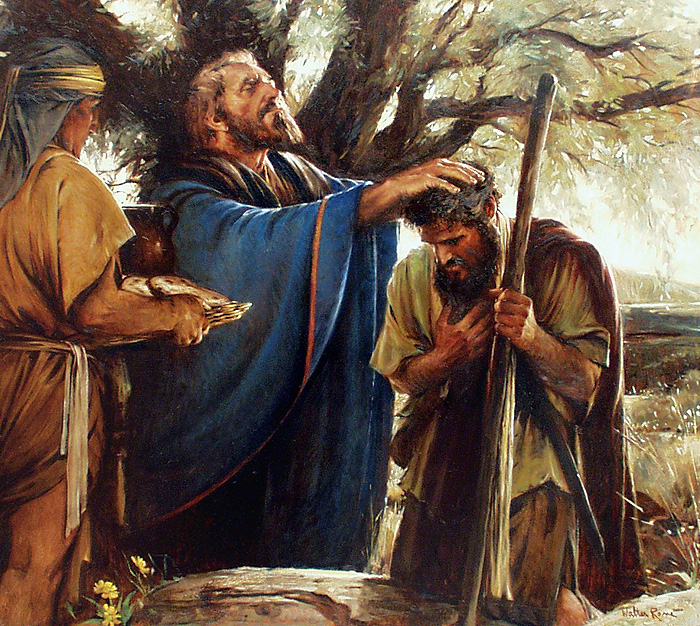 Abraham sought after his priesthood blessing and to that end was Abraham blessed. Melchizedek, the great high
priest of his day, is who did bestow the priesthood upon Abraham. Certainly Abraham had come to Melchizedek
often and not just to pay tithes that one time only.
Abraham sought after his priesthood blessing and to that end was Abraham blessed. Melchizedek, the great high
priest of his day, is who did bestow the priesthood upon Abraham. Certainly Abraham had come to Melchizedek
often and not just to pay tithes that one time only.
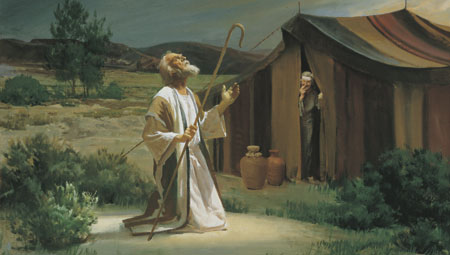
To understand Abraham's blessings of the fathers is to learn that the Akedah or 'the binding' is not just a reference to Abraham obeying God and binding Isaac in fetters upon an altar of sacrifice. It is the binding of the heart of the fathers to the children and the children to the fathers that is being bound and sealed by the sacrifice of God. Both Abraham and Isaac learned their roles and parts well, that they Father had sworn an oath and the son was to keep that oath of the Father at the expense of his life. And it is the power of that sacrifice which empowers God to bind and seal men unto him. No fetters would have kept young strong Isaac from escape and over powering his elderly father. It was the willingness of the son to do the Father's will which binds the generations of men unto God by the priesthood power of the Everlasting Gospel.
- Names: Abram, Abraham12
- Age at time of death: 17513
- Premortal roles: One of the great and noble ones who received a pre-ordination blessing to fulfill a critical role and function on earth to be the continuing bearer of the Everlasting Covenant unto the blessing of every nation, kindred, tongue and people.14
- Mortal roles: A Father of the Covenant, 'The Covenant of Abraham', husband, and father; helped to carry forward the everlasting covenant; lived the gospel of Jesus Christ and to fulfill his blessed role as the earth's 'Father of the Faithful'.15
- [Abraham wrote his own book of 'scripture' a part of which we have as the Book of Abraham in the Pearl of Great Price. Abraham stands as the 'adoptive' father of all 'Israel' in that through the ordiances of the Gospel of Jesus Christ we all are counted as the sons and daughters of Abraham and are blessed accordingly with the blessings of the fathers, that is the Everlasting Covenant of God.]
- Postmortal roles: Scripturally there is nothing specifically specified but implied in his role as being the 'Father of the Faithful', that is all who are baptized into Christ, and thus Abraham will likely have a presiding role to play in the Church and Kingdom of Jesus Christ.
As with all bearers of the Everlasting Covenant, the covenant was 'tailored' to Abraham, his day and positional role he was to play in carring forward that Covenant. For example, Adam was the Ancient of Day, the father of all living who led us into mortality. Enoch bore the covenant and pasted in on but also applied it principles unto he and his city being translated.Noah was the covenant reborn after the flood and he assumed the role of all living since his day. And so was the covenant 'tailored' to Abraham as well.
_______________
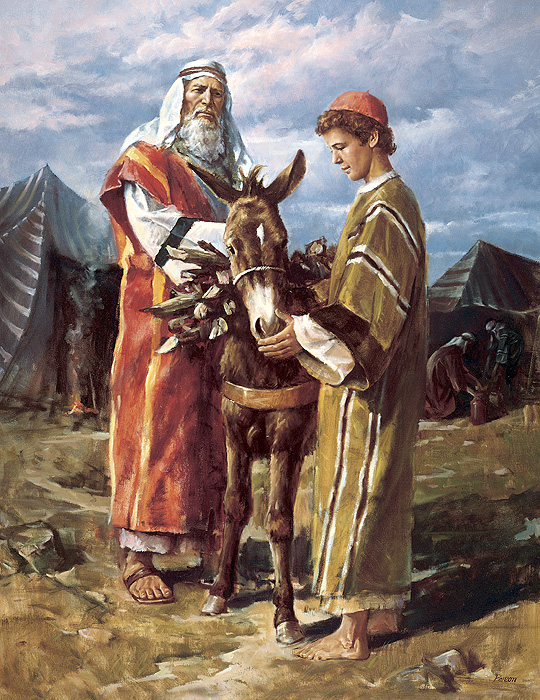 1. Spencer W. Kimball, “The Example of Abraham,” Ensign, June 1975, 7.
1. Spencer W. Kimball, “The Example of Abraham,” Ensign, June 1975, 7.2. See Abraham 1:1–8.
3. See Abraham 1:12, 15–16.
4. See Doctrine and Covenants 84:14.
5. See Genesis 17:1–9; Abraham 2:8–11; Bible Dictionary, “Abraham.”
6. See Abraham 2:4, 18–19.
7. See Genesis 17:15–21.
8. See Genesis 21:1–3.
9. See Genesis 22:12.
10. See Genesis 22:1–13.
11. See Genesis 22:17–18.
12. See Genesis 17:5.
13. See Genesis 25:7.
14. See Genesis 18:18; D&C 84:33-34; Galatians 3:8 & 27-29
15. See Galatians 3:9; D&C 138:41
rev. 23 February 2014